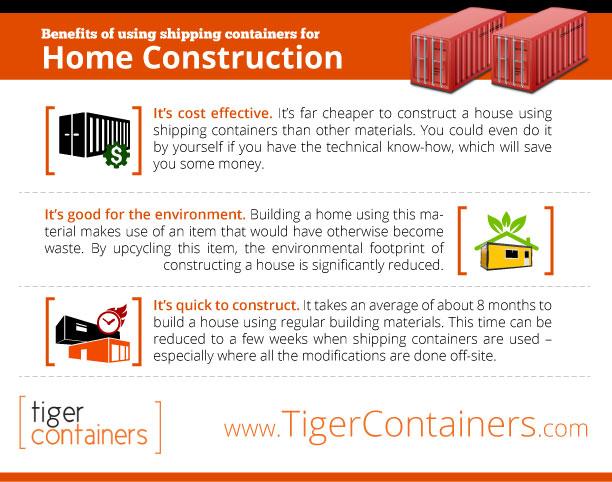
In one form or another shipping containers have been around for centuries, but it was in the 1950s that they became what we recognise today. For many years shipping containers were really only used for transporting cargo on ships, trains and trucks, or for the storage of goods on industrial sites.
In the modern world, this is still their primary purpose, but people have come to realise just how flexible shipping containers really are. Not flexible in the literal sense, as they are constructed from solid steel, but flexibility of use and their potential applications.
Today cargo containers are being repurposed for all sorts of structures and projects, and we’ll take a look at some of the more common ones in this post.
House Construction
This is something that’s really been trending in a big way in recent decades, the use of new or used shipping containers to build houses. There are a number of reasons why containers have become so popular for home building and other structures:
- Shipping containers are a cost-effective building material that saves money on the construction process
- Using containers speed up the building process, as much of the construction is already in place
- Repurposing used shipping containers gives them a new lease of life and stops them from ending up in landfill, which is great for the environment
- Steel cargo containers are super strong and sturdy, making them an excellent choice of building material
Those are some of the main reasons shipping containers have become so popular for repurposing, especially for home building. They are also a novel idea that adds a touch of character and uniqueness to the home.
The containers used in the home build can either be a feature that stands out (in a good way), or the containers can basically be covered up so no one even knows of their existence. It really depends on the design you go for and what you hope to achieve.
Containers are also versatile in that they are stackable, so whether you use 20-foot containers or the mammoth 40 footer, you can make your house as large or small as you like. You can even add levels and make it a two or three storey home. It’s all possible with shipping containers.

Image from Tiger Containers
On-Site Or Home Office Space
This is another very popular use of the humble shipping container.
For many years they’ve been used as mobile construction site offices. These containers are pretty much as is, except for the inclusion of some windows and a door, as well as a desk and office equipment inside. The advantage of on-site offices made from shipping containers is they can easily be loaded up onto a truck and transported to the next building project.
When it comes to home offices there might be a little more added to the conversion process, and you might locate your home office in either the front yard or the backyard, depending on space and accessibility to get the container office in.
For the home office, your modified container allows you to separate your work space from your home and bring in clients for meetings without having to actually enter your house. That’s great for your privacy as well as looking a little more professional and established.
The Granny Flat
A granny flat doesn’t have to be reserved for Grandma. It can be used as a teenage retreat or a space you can rent out for some extra income.
Building a small and functional, self-contained granny flat from a shipping container is one of their most popular uses to date.
Even the 20ft container is big enough to be converted into a space that can fit a bed, small living room, bathroom and kitchenette.
The granny flat can either be a stand-alone structure in the backyard or attached to the home as a spare, self-contained bedroom.
Sheds and Backyard Workshops
Even the very small 10-foot shipping container can make for a very solid, durable and secure backyard shed, big enough for storing the lawnmower and garden tools, and whatever else you may keep in your shed.
The 20-foot container is a fantastic size to convert into a workshop, either for the home or your place of business. If you’re doing machining, woodworking or indulging a hobby, a shipping container workshop is a great option.
Possibly a container that has the doors on the side would be the best choice. You could remove the steel doors and replace them with roller doors or even glass sliding doors, depending on what you’re using your workshop for.
Pop-Up Stores, Cafes, Restaurants and Bars

What’s really trending in a major way in recent times is the conversion of shipping containers into:
- Pop-up stores
- Roadside kitchens
- Restaurants
- Cafes
- Bars
- Mobile pizzerias
- And more…
As you can see, shipping containers are so flexible in their potential uses that they can be converted into practically anything that requires a structure.
Vendors that supply food and drinks at various events and trade shows are converting small shipping containers into mobile eateries that can easily be transported from place to place, or even mounting the converted container permanently on the back of a truck and driving it from location to location.
Many of the cafes, bars and restaurants make it quite obvious that they’ve used cargo containers in the construction. Why? Because it’s a novel idea that becomes a talking point and a drawcard for the business. It also shows that business owners care about recycling, which elevates their business higher up in the eyes of consumers.
Some cafes are actually made to be mobile just like the “food van” idea. This way the proprietors can set up wherever they are required, adding flexibility to their business and the ability to be able to chase the customers rather than be in one spot, always hoping to draw customers to their location.
The Takeaway
No matter what your project, if it requires some form of building and construction, then shipping containers are worth serious consideration. You’ll save time, money and the planet in the process.
————————————
Author Bio:

Ashley Bryan is an Internet Strategist and SEO professional based in Queensland, Australia, with 20 years’ experience in the field. He actively writeson topics of personal interest or for businesses across Australia and New Zealand.https://www.websitestrategies.com.au


